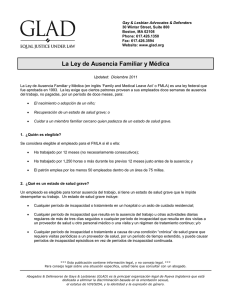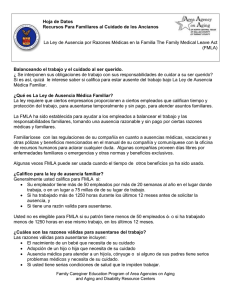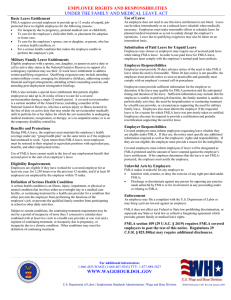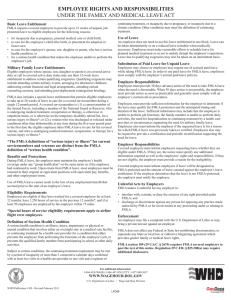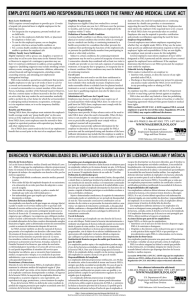EMPLOYEE RIGHTS AND RESPONSIBILITIES
Anuncio
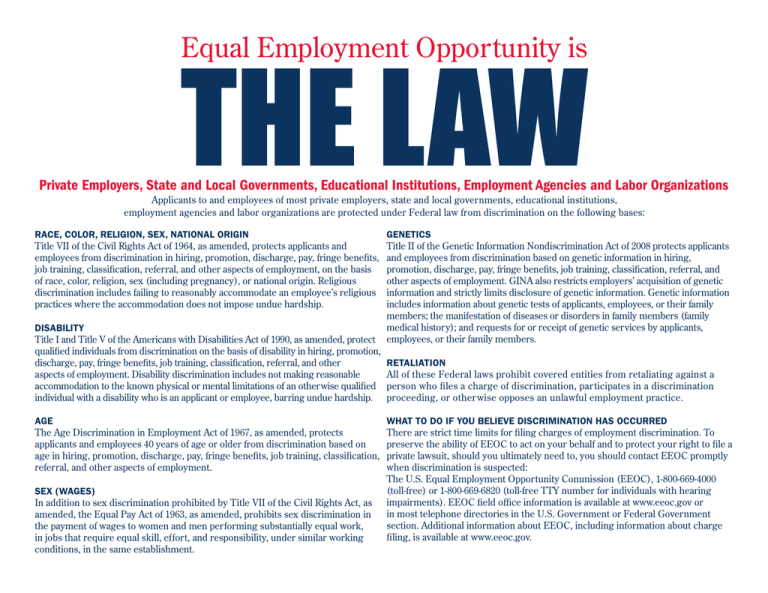
THE LAW Equal Employment Opportunity is Private Employers, State and Local Governments, Educational Institutions, Employment Agencies and Labor Organizations � Applicants to and employees of most private employers, state and local governments, educational institutions, employment agencies and labor organizations are protected under Federal law from discrimination on the following bases: � RACE, COLOR, RELIGION, SEX, NATIONAL ORIGIN Title VII of the Civil Rights Act of 1964, as amended, protects applicants and employees from discrimination in hiring, promotion, discharge, pay, fringe benefits, job training, classification, referral, and other aspects of employment, on the basis of race, color, religion, sex (including pregnancy), or national origin. Religious discrimination includes failing to reasonably accommodate an employee’s religious practices where the accommodation does not impose undue hardship. DISABILITY Title I and Title V of the Americans with Disabilities Act of 1990, as amended, protect qualified individuals from discrimination on the basis of disability in hiring, promotion, discharge, pay, fringe benefits, job training, classification, referral, and other aspects of employment. Disability discrimination includes not making reasonable accommodation to the known physical or mental limitations of an otherwise qualified individual with a disability who is an applicant or employee, barring undue hardship. AGE The Age Discrimination in Employment Act of 1967, as amended, protects applicants and employees 40 years of age or older from discrimination based on age in hiring, promotion, discharge, pay, fringe benefits, job training, classification, referral, and other aspects of employment. SEX (WAGES) In addition to sex discrimination prohibited by Title VII of the Civil Rights Act, as amended, the Equal Pay Act of 1963, as amended, prohibits sex discrimination in the payment of wages to women and men performing substantially equal work, in jobs that require equal skill, effort, and responsibility, under similar working conditions, in the same establishment. GENETICS Title II of the Genetic Information Nondiscrimination Act of 2008 protects applicants and employees from discrimination based on genetic information in hiring, promotion, discharge, pay, fringe benefits, job training, classification, referral, and other aspects of employment. GINA also restricts employers’ acquisition of genetic information and strictly limits disclosure of genetic information. Genetic information includes information about genetic tests of applicants, employees, or their family members; the manifestation of diseases or disorders in family members (family medical history); and requests for or receipt of genetic services by applicants, employees, or their family members. RETALIATION All of these Federal laws prohibit covered entities from retaliating against a person who files a charge of discrimination, participates in a discrimination proceeding, or other wise opposes an unlawful employment practice. WHAT TO DO IF YOU BELIEVE DISCRIMINATION HAS OCCURRED There are strict time limits for filing charges of employment discrimination. To preserve the ability of EEOC to act on your behalf and to protect your right to file a private lawsuit, should you ultimately need to, you should contact EEOC promptly when discrimination is suspected: The U.S. Equal Employment Opportunity Commission (EEOC), 1-800-669-4000 (toll-free) or 1-800-669-6820 (toll-free TTY number for individuals with hearing impairments). EEOC field office information is available at www.eeoc.gov or in most telephone directories in the U.S. Government or Federal Government section. Additional information about EEOC, including information about charge filing, is available at www.eeoc.gov. Employers Holding Federal Contracts or Subcontracts Applicants to and employees of companies with a Federal government contract or subcontract are protected under Federal law from discrimination on the following bases: RACE, COLOR, RELIGION, SEX, NATIONAL ORIGIN Executive Order 11246, as amended, prohibits job discrimination on the basis of race, color, religion, sex or national origin, and requires affirmative action to ensure equality of opportunity in all aspects of employment. INDIVIDUALS WITH DISABILITIES Section 503 of the Rehabilitation Act of 1973, as amended, protects qualified individuals from discrimination on the basis of disability in hiring, promotion, discharge, pay, fringe benefits, job training, classification, referral, and other aspects of employment. Disability discrimination includes not making reasonable accommodation to the known physical or mental limitations of an otherwise qualified individual with a disability who is an applicant or employee, barring undue hardship. Section 503 also requires that Federal contractors take affirmative action to employ and advance in employment qualified individuals with disabilities at all levels of employment, including the executive level. DISABLED, RECENTLY SEPARATED, OTHER PROTECTED, AND ARMED FORCES SERVICE MEDAL VETERANS The Vietnam Era Veterans’ Readjustment Assistance Act of 1974, as amended, 38 U.S.C. 4212, prohibits job discrimination and requires affirmative action to employ and advance in employment disabled veterans, recently separated veterans (within three years of discharge or release from active duty), other protected veterans (veterans who served during a war or in a campaign or expedition for which a campaign badge has been authorized), and Armed Forces service medal veterans (veterans who, while on active duty, participated in a U.S. military operation for which an Armed Forces service medal was awarded). RETALIATION Retaliation is prohibited against a person who files a complaint of discrimination, participates in an OFCCP proceeding, or otherwise opposes discrimination under these Federal laws. Any person who believes a contractor has violated its nondiscrimination or affirmative action obligations under the authorities above should contact immediately: The Office of Federal Contract Compliance Programs (OFCCP), U.S. Department of Labor, 200 Constitution Avenue, N.W., Washington, D.C. 20210, 1-800-397-6251 (toll-free) or (202) 693-1337 (TTY). OFCCP may also be contacted by e-mail at OFCCP-Public@dol.gov, or by calling an OFCCP regional or district office, listed in most telephone directories under U.S. Government, Department of Labor. Programs or Activities Receiving Federal Financial Assistance RACE, COLOR, NATIONAL ORIGIN, SEX In addition to the protections of Title VII of the Civil Rights Act of 1964, as amended, Title VI of the Civil Rights Act of 1964, as amended, prohibits discrimination on the basis of race, color or national origin in programs or activities receiving Federal financial assistance. Employment discrimination is covered by Title VI if the primary objective of the financial assistance is provision of employment, or where employment discrimination causes or may cause discrimination in providing services under such programs. Title IX of the Education Amendments of 1972 prohibits employment discrimination on the basis of sex in educational programs or activities which receive Federal financial assistance. EEOC 9/02 and OFCCP 8/08 Versions Useable With 11/09 Supplement INDIVIDUALS WITH DISABILITIES Section 504 of the Rehabilitation Act of 1973, as amended, prohibits employment discrimination on the basis of disability in any program or activity which receives Federal financial assistance. Discrimination is prohibited in all aspects of employment against persons with disabilities who, with or without reasonable accommodation, can perform the essential functions of the job. If you believe you have been discriminated against in a program of any institution which receives Federal financial assistance, you should immediately contact the Federal agency providing such assistance. EEOC-P/E-1 (Revised 11/09) EMPLOYEE RIGHTS AND RESPONSIBILITIES UNDER THE FAMILY AND MEDICAL LEAVE ACT Basic Leave Entitlement Use of Leave FMLA requires covered employers to provide up to 12 weeks of unpaid, jobprotected leave to eligible employees for the following reasons: x For incapacity due to pregnancy, prenatal medical care or child birth; x To care for the employee’s child after birth, or placement for adoption or foster care; x To care for the employee’s spouse, son or daughter, or parent, who has a serious health condition; or x For a serious health condition that makes the employee unable to perform the employee’s job. An employee does not need to use this leave entitlement in one block. Leave can be taken intermittently or on a reduced leave schedule when medically necessary. Employees must make reasonable efforts to schedule leave for planned medical treatment so as not to unduly disrupt the employer’s operations. Leave due to qualifying exigencies may also be taken on an intermittent basis. Military Family Leave Entitlements Eligible employees with a spouse, son, daughter, or parent on active duty or call to active duty status in the National Guard or Reserves in support of a contingency operation may use their 12-week leave entitlement to address certain qualifying exigencies. Qualifying exigencies may include attending certain military events, arranging for alternative childcare, addressing certain financial and legal arrangements, attending certain counseling sessions, and attending post-deployment reintegration briefings. FMLA also includes a special leave entitlement that permits eligible employees to take up to 26 weeks of leave to care for a covered servicemember during a single 12-month period. A covered servicemember is a current member of the Armed Forces, including a member of the National Guard or Reserves, who has a serious injury or illness incurred in the line of duty on active duty that may render the servicemember medically unfit to perform his or her duties for which the servicemember is undergoing medical treatment, recuperation, or therapy; or is in outpatient status; or is on the temporary disability retired list. Substitution of Paid Leave for Unpaid Leave Employees may choose or employers may require use of accrued paid leave while taking FMLA leave. In order to use paid leave for FMLA leave, employees must comply with the employer’s normal paid leave policies. Employee Responsibilities Employees must provide 30 days advance notice of the need to take FMLA leave when the need is foreseeable. When 30 days notice is not possible, the employee must provide notice as soon as practicable and generally must comply with an employer’s normal call-in procedures. Employees must provide sufficient information for the employer to determine if the leave may qualify for FMLA protection and the anticipated timing and duration of the leave. Sufficient information may include that the employee is unable to perform job functions, the family member is unable to perform daily activities, the need for hospitalization or continuing treatment by a health care provider, or circumstances supporting the need for military family leave. Employees also must inform the employer if the requested leave is for a reason for which FMLA leave was previously taken or certified. Employees also may be required to provide a certification and periodic recertification supporting the need for leave. Employer Responsibilities Benefits and Protections During FMLA leave, the employer must maintain the employee’s health coverage under any “group health plan” on the same terms as if the employee had continued to work. Upon return from FMLA leave, most employees must be restored to their original or equivalent positions with equivalent pay, benefits, and other employment terms. Use of FMLA leave cannot result in the loss of any employment benefit that accrued prior to the start of an employee’s leave. Eligibility Requirements Employees are eligible if they have worked for a covered employer for at least one year, for 1,250 hours over the previous 12 months, and if at least 50 employees are employed by the employer within 75 miles. Definition of Serious Health Condition A serious health condition is an illness, injury, impairment, or physical or mental condition that involves either an overnight stay in a medical care facility, or continuing treatment by a health care provider for a condition that either prevents the employee from performing the functions of the employee’s job, or prevents the qualified family member from participating in school or other daily activities. Subject to certain conditions, the continuing treatment requirement may be met by a period of incapacity of more than 3 consecutive calendar days combined with at least two visits to a health care provider or one visit and a regimen of continuing treatment, or incapacity due to pregnancy, or incapacity due to a chronic condition. Other conditions may meet the definition of continuing treatment. Covered employers must inform employees requesting leave whether they are eligible under FMLA. If they are, the notice must specify any additional information required as well as the employees’ rights and responsibilities. If they are not eligible, the employer must provide a reason for the ineligibility. Covered employers must inform employees if leave will be designated as FMLA-protected and the amount of leave counted against the employee’s leave entitlement. If the employer determines that the leave is not FMLAprotected, the employer must notify the employee. Unlawful Acts by Employers FMLA makes it unlawful for any employer to: x Interfere with, restrain, or deny the exercise of any right provided under FMLA; x Discharge or discriminate against any person for opposing any practice made unlawful by FMLA or for involvement in any proceeding under or relating to FMLA. Enforcement An employee may file a complaint with the U.S. Department of Labor or may bring a private lawsuit against an employer. FMLA does not affect any Federal or State law prohibiting discrimination, or supersede any State or local law or collective bargaining agreement which provides greater family or medical leave rights. FMLA section 109 (29 U.S.C. § 2619) requires FMLA covered employers to post the text of this notice. Regulations 29 C.F.R. § 825.300(a) may require additional disclosures. ____________________________________________________________________________________________________________________________________________________________________________________________________________________________________________________________________________________________________________________________________________________________________________________________________________________________________________________________________________________________________________________________ For additional information: 1-866-4US-WAGE (1-866-487-9243) TTY: 1-877-889-5627 WWW.WAGEHOUR.DOL.GOV U.S. Department of Labor | Employment Standards Administration | Wage and Hour Division WHD Publication 1420 Revised January 2009 DERECHOS Y RESPONSABILIDADES DEL EMPLEADO BAJO LA LEY DE AUSENCIA FAMILIAR Y MÉDICA Derechos Básicos de Ausencia La Ley de Ausencia Familiar y Médica (FMLA-en sus siglas en inglés) exige que todo empresario sujeto a la Ley provea a sus empleados elegibles hasta 12 semanas de ausencia del trabajo, no pagadas y con protección del puesto, por las siguientes razones: • Por incapacidad causada por embarazo, atención médica prenatal o parto; • Para atender a un hijo del empleado después de su nacimiento, o su colocación para adopción o crianza; • Para atender a un cónyuge, hijo(a), o padres del/de la empleado(a), el/la cual padezca de una condición de salud seria; o • A causa de una condición de salud seria que le impida al empleado desempeñar su puesto. Beneficios y Protecciones Durante una ausencia bajo FMLA, el empresario ha de mantener en vigor el seguro de salud del empleado bajo cualquier “plan de seguro colectivo de salud” con los mismos términos como si el empleado hubiese seguido trabajando. Al regresar de una ausencia de FMLA, a la mayoría de los empleados se le ha de restaurar a su puesto original o puesto equivalente con sueldo, beneficios y otros términos de empleo equivalentes. Derechos de Ausencia Para Familias Militares Empleados elegibles con un cónyuge, hijo, hija, o padre que esté en servicio activo o se le haya avisado de una llamada a estado de servicio activo en la Guardia Nacional o las Reservas para respaldar una operación contingente, pueden usar su derecho de ausencia de 12 semanas para atender ciertas exigencias calificadoras. Las exigencias calificadoras pueden incluir la asistencia a ciertos eventos militares, la fijación del cuido alternativo de hijos, para atender ciertos arreglos financieros y legales, para asistir a ciertas consultas con consejeros, y para asistir a sesiones de intrucción posdespliegue de reintegración. Requisitos Para Elegibilidad El empleado es elegible si ha trabajado para el empresario bajo el alcance de la Ley por lo menos por un año, por 1,250 horas durante los previos 12 meses, y si el empresario emplea por lo menos 50 empleados dentro de un área de 75 millas. FMLA también incluye un derecho especial de ausencia que concede a empleados elegibles ausentarse del trabajo hasta 26 semanas para atender a un miembro del servicio militar bajo el alcance de la Ley durante un período único de 12 meses. Un miembro del servicio militar bajo el alcance de la Ley es un miembro actual de las Fuerzas Armadas, inclusive un miembro de la Guardia Nacional o las Reservas, que padece de una lesión o enfermedad grave sufrida en cumplimiento del deber en el servicio activo que puede incapacitar, por razones médicas, al miembro del servicio militar para desempeñar sus deberes y por la cual recibe tratamientos médicos, recuperación, o terapia; o está en estado de paciente no hospitalizado; o aparece en la lista de jubilados temporalmente por minusvalidez. El tomar una ausencia bajo FMLA no puede resultar en la pérdida de ningún beneficio de empleo acumulado antes de que el empleado comenzara la ausencia. Definición de una Condición de Salud Seria Una condición de salud seria es una enfermedad, lesión, impedimento, o condición física o mental que involucra o una pernoctación en un establecimiento de atención médica, o el tratamiento continuo bajo un servidor de atención médica que, o le impide al empleado desempeñar las funciones de su puesto, o impide al miembro de la familia que califica participar en actividades escolares o en otras actividades diarias. Dependiendo de ciertas condiciones, se puede cumplir con el requisito de tratamiento continuo con un período de incapacidad de más de 3 días civiles consecutivos en combinación con por lo menos dos visitas a un servidor de atención médica o una visita y un régimen de tratamiento continuo, o incapacidad a causa de un embarazo, o incapacidad a causa de una condición crónica. Otras condiciones pueden satisfacer la definición de un tratamiento continuo. Uso de la Ausencia El empleado no necesita usar este derecho de ausencia todo de una vez. La ausencia se puede tomar intermitentemente o según un horario de ausencia reducido cuando sea médicamente necesario. El empleado ha de esforzarse razonablemente cuando hace citas para tratamientos médicos planificados para no interrumpir indebidamente las operaciones del empresario. Ausencias causadas por exigencias calificadoras también pueden tomarse intermitentemente. Substitución de Ausencia Pagada por Ausencia No Pagada El empleado puede escoger o el empresario puede exigir el uso de ausencias pagadas acumuladas mientras se toma ausencia bajo FMLA. Para poder usar ausencias pagadas cuando toma FMLA, el empleado ha de cumplir con la política normal del empresario que rija las ausencias pagadas. Responsabilidades del Empleado El empleado ha de proveer un aviso con 30 días de anticipación cuando necesita ausentarse bajo FMLA cuando la necesidad es previsible. Cuando no sea posible proveer un aviso con 30 días de anticipación, el empleado ha de proveer aviso en cuanto sea factible y, en general, ha de cumplir con los procedimientos normales del empresario en cuanto a llamar para reporter su ausencia. Responsabilidades del Empresario Los empresarios bajo el alcance de FMLA han de informar a los empleados solicitando ausencia si son o no elegibles bajo FMLA. Si lo son, el aviso ha de especificar cualquier otra información exigida tanto como los derechos y las responsabilidades del empleado. Si no son elegibles, el empresario ha de proveer una razón por la inelegibilidad. Los empresarios bajo el alcance de la Ley han de informar a los empleados si la ausencia se va a designar protegida por FMLA y la cantidad de tiempo de la ausencia que se va a contar contra el derecho del empleado para ausentarse. Si el empresario determina que la ausencia no es protegida por FMLA, el empresario ha de notificar al empleado de esto. Actos Ilegales Por Parte del Empresario La ley FMLA le prohíbe a todo empresario: • que interfiera con, limite, o niegue el ejercicio de cualquier derecho estipulado por FMLA; • que se despida a, o se discrimine en contra de, alguien que se oponga a una práctica prohibida por FMLA o porque se involucre en cualquier procedimiento bajo o relacionado a FMLA. Cumplimiento El empleado puede presentar una denuncia con el El empleado ha de proporcionar suficiente información Departamento de Trabajo de EEUU o puede presentar para que el empresario determine si la ausencia un pleito particular contra el empresario. califica para la protección de FMLA, con la fecha y la duración anticipadas de la ausencia. Suficiente FMLA no afecta ninguna otra ley federal o estatal información puede incluir que el empleado no puede que prohíbe la discriminación, o invalida ninguna ley desempeñar las funciones del puesto, que el miembro estatal o local o ninguna negociación colectiva que de la familia no puede desempeñar las actividades provea derechos superiores familiares o médicos. diarias, la necesidad de ser hospitalizado o de seguir un régimen continuo bajo un servidor de atención La Sección 109 de FMLA (29 U.S.C. § 2619) exige médica, o circunstancias que exijan una necesidad de que todo empresario bajo el alcance de FMLA ausencia familiar militar. Además, el empleado ha de exhiba el texto de este aviso. Los Reglamentos 29 informar al empresario si la ausencia solicitada es por C.F.R. § 825.300(a) pueden exigir divulgaciones una razón por la cual se había previamente tomado adicionales. o certificado FMLA. También se le puede exigir al empleado que provea certificación y recertificación periódicamente constatando la necesidad para la ausencia. Si precisa información adicional: 1-866-4US-WAGE (1-866-487-9243) TTY: 1-877-889-5627 WWW.WAGEHOUR.DOL.GOV U.S. Department of Labor | Employment Standards Administration | Wage and Hour Division WHD Publication 1420 Revised January 2009
